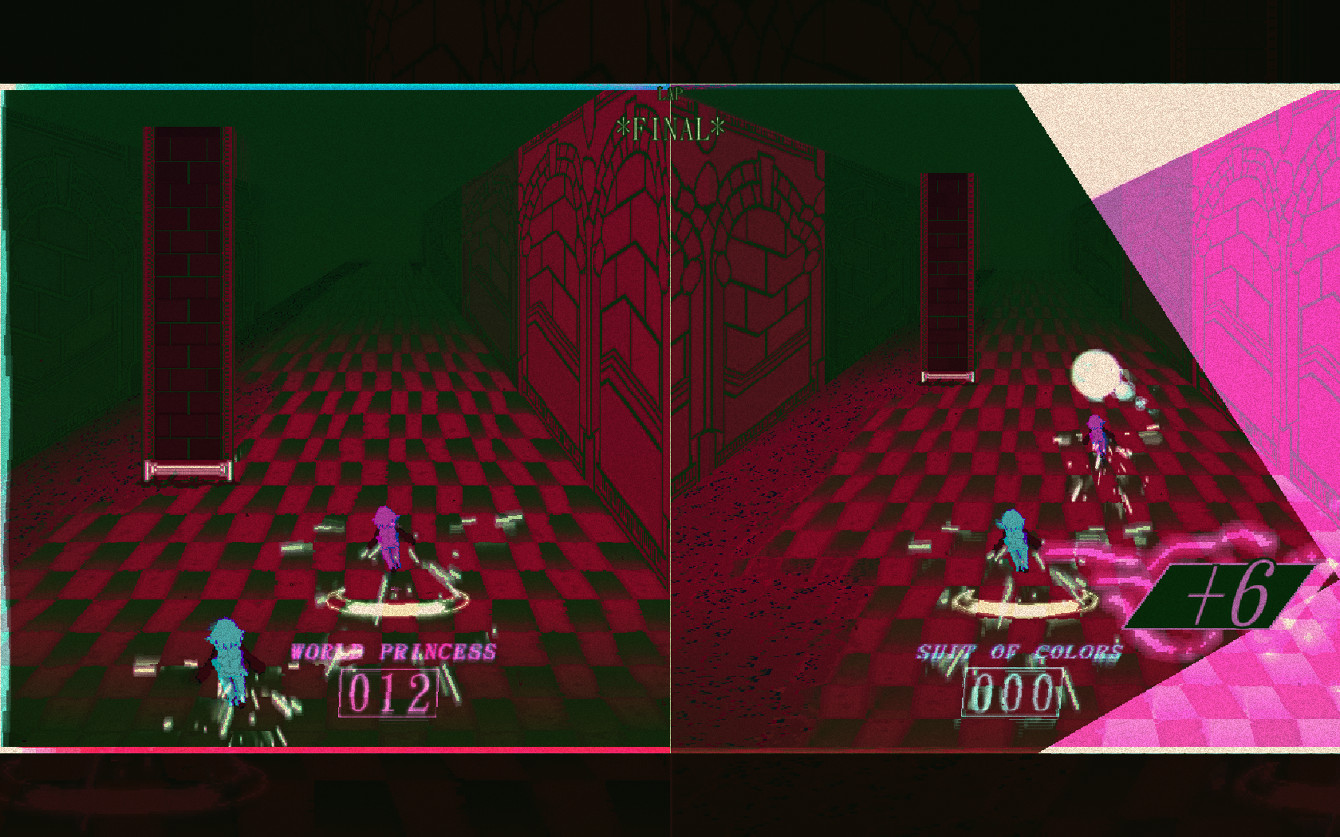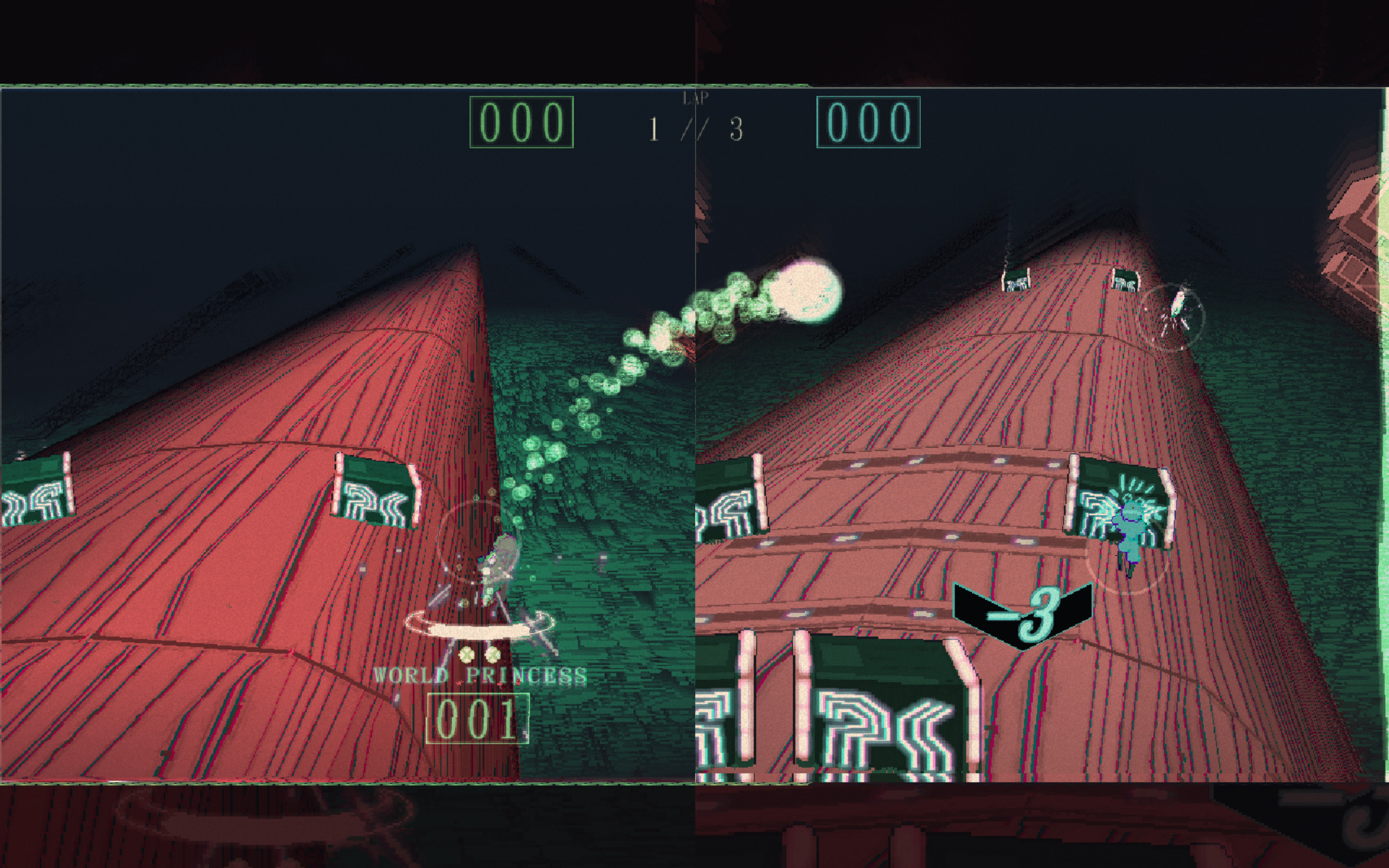Witchball is Pong reinterpreted as a sci-fi racing game
In the grim darkness of the far future there is only high-speed volleyball.

Witchball, a self-described "post-reality racing game" from developer Stephen Clark, pits two players against each other in a race to the finish on several basic courses with obstacles. It’s also Pong.
A ball floats in between the two halves of the screen and players try to score on the other. Keep in mind, though, you have to do both at the same time. And you can grab the ball on either side of the screen. And you can spike it. And you have items which reverse your position and mess with the ball’s placement and allow you to avoid obstacles on the race course. And you have to focus on passing the ball while avoiding said obstacles, except you can’t turn while you’re holding the ball so you need to time your grabs accordingly. By the end of it, someone has hundreds of points, it’s mostly unclear how that happened, and you absolutely have to press "retry".
Witchball might feel like an arcade classic, but the way it presents itself is very different. In the year 2601, the world has all but ended—society has crumbled, environmental change has left swaths of the world uninhabitable, and children in the areas that remain have mastered long-distance communication and use it to play futuristic sports. Witchball is that sport.
...spooky apocalyptic corridors, flashes of neon light, and pixelated blurs flow together with pulsing sound and thumping rhythms.
The visuals drive the setting home: neon bleeds through a dark landscape, the ball pulses and grows as it’s passed between two racers running at lightning speeds down eerie canyons and unending tubes. A cyberpunk synthwave soundtrack that reminds me of Kavinsky or Perturbator drives you forward, pushing you to go faster, faster still.
The controls are simple, but the pace demands absolute mastery. It's a local multiplayer-only affair that can be played with two controllers or, for the daring, one shared between two players. Players move left and right to dodge obstacles and aim themselves at the ball, forward to use their energy and get a speed advantage on the track, and two buttons: one to use items and one to catch the ball.

When the ball is caught—unlike Pong, this is a "catch and throw" sort of game—players can easily aim the ball’s direction, or execute a quick tap to send out a blistering spike. The track is mirrored on both sides of the screen for each player, though a unique twist here is that players can catch the ball on either side of the screen. The more the ball is passed back and forth, the larger and faster it becomes, and larger balls are worth more points. Players gain points for winning a given lap and scoring goals on the other player with the ball, and lose points for smacking into obstacles.
On the harder courses, this means that players often have to choose between letting the ball go or dodging an obstacle. Of course, items can level the playing field—the "World Princess" allows players to phase through obstacles, for example. Items can move the ball to the other side of the screen, reverse which side of the course you’re racing on, or change the positions of the racers. The descriptions of each item are vague sentences full of dread and names like "Denial". Discovering an ideal playstyle is a process of playing over and over and realizing what helps and what slows you down. There’s a learning curve but a game between two skilled players is gorgeous in motion—spooky apocalyptic corridors, flashes of neon light, and pixelated blurs flow together with pulsing sound and thumping rhythms.
Keep up to date with the most important stories and the best deals, as picked by the PC Gamer team.
This focus on frenzied local multiplayer battles ends up feeling like a peek into a larger world. I’d be very excited to see an expansion of this concept with more tracks, more options, and more modes. I’d love to be able to play this game online with friends, and a single-player AI battle mode that would allow players to practice their skills would be more than welcome.

Witchball’s combination of fast-paced racing, obstacle-dodging, frenetic volleyball, dangerous items, and foreboding presentation makes for an unforgettable competitive experience. It might benefit from presenting itself with a touch more clarity, but by shrouding itself in so much mystery and dread it only eggs you on to keep trying. At its best moments, it feels reminiscent of Niddhogg.
Witchball captures the basic competitive edge that drove hours of old-school gaming on the couch with my friends. Plans for simple one-on-one pickup games with guests at home turned into hour-long affairs. The more we played, the better we got, and the more frantic it became. "One more game" became a common refrain. If the end of the world is as fun as it is here, then bring it on.
Witchball is available on Steam.

